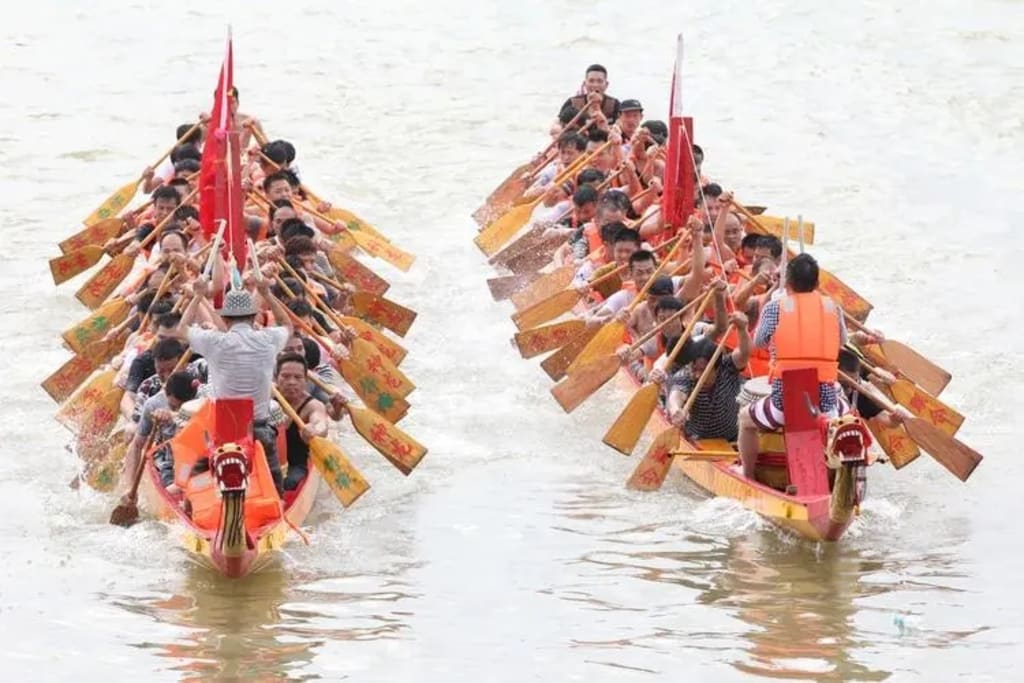
The Dragon Boat Festival, also known as Duanwu Festival, is a traditional Chinese holiday that is celebrated on the fifth day of the fifth lunar month, which usually falls in June on the Gregorian calendar. The festival has a history of over 2,000 years and is celebrated in many parts of China and around the world.
The Dragon Boat Festival is named after the dragon boats that are used in the traditional dragon boat races, which are a central part of the festival. Dragon boats are long, narrow boats that are decorated with dragon heads and tails. Each boat is manned by a team of rowers who paddle to the beat of a drum. The races are held in rivers and lakes across China and are a symbol of teamwork, strength, and perseverance.
The origins of the Dragon Boat Festival are rooted in Chinese mythology and history. One of the most popular legends associated with the festival is the story of Qu Yuan, a poet and statesman who lived during the Warring States period (475-221 BC) in ancient China. Qu Yuan was a loyal and patriotic official who was exiled from his home state of Chu after he was falsely accused of treason. In despair, he threw himself into the Miluo River and drowned.
The people of Chu were devastated by Qu Yuan's death and raced to the river to try to save him. They beat drums and splashed their paddles in the water to scare away the fish and prevent them from eating Qu Yuan's body. They also threw rice dumplings, known as zongzi, into the river as a sacrifice to his spirit.
Today, the Dragon Boat Festival is celebrated in many different ways. In addition to dragon boat races, people also eat zongzi, which are pyramid-shaped dumplings made of glutinous rice and filled with different kinds of meat, vegetables, and sweets. Zongzi are wrapped in bamboo leaves and steamed or boiled, and are a symbol of the tradition and culture of the festival.
Other common activities during the Dragon Boat Festival include hanging mugwort and calamus leaves on doorways to ward off evil spirits, drinking realgar wine, and wearing fragrant sachets to repel insects and disease.
Overall, the Dragon Boat Festival is a time for people to come together to celebrate their culture, history, and traditions. It is a time to honor the memory of Qu Yuan and other heroes who have sacrificed themselves for the good of their country and people, and to reflect on the values of loyalty, patriotism, and unity.
More information about Quyuan:
Qu Yuan was a Chinese poet and politician who lived during the Warring States period (475-221 BC). He was born into a noble family and served as an official in the state of Chu, one of the seven warring states of the time. Qu Yuan was known for his patriotic spirit and his efforts to promote social and political reforms in Chu.
Despite his many achievements, Qu Yuan fell out of favor with the Chu court and was exiled from his homeland. During his exile, Qu Yuan wrote many poems expressing his love for his country and his sorrow at its current state of political turmoil.
Legend has it that Qu Yuan drowned himself in the Miluo River as a final act of protest against the corruption and injustice of the Chu court. The people who admired him raced to the river in boats to try to save him, but it was too late. In honor of his memory, the people of Chu began the tradition of dragon boat racing and eating zongzi, a type of glutinous rice dumpling wrapped in bamboo leaves, on the anniversary of Qu Yuan's death.
Qu Yuan's poetry has had a lasting impact on Chinese literature and his story is still celebrated today as a symbol of Chinese patriotism and cultural heritage.
About the Creator
David cen
Share Chinese Sory,which you never heard before.China has 5000 years history and it is A kingdom of artifacts.Such as Chinese Kongfu,Qigong etc.






Comments
There are no comments for this story
Be the first to respond and start the conversation.